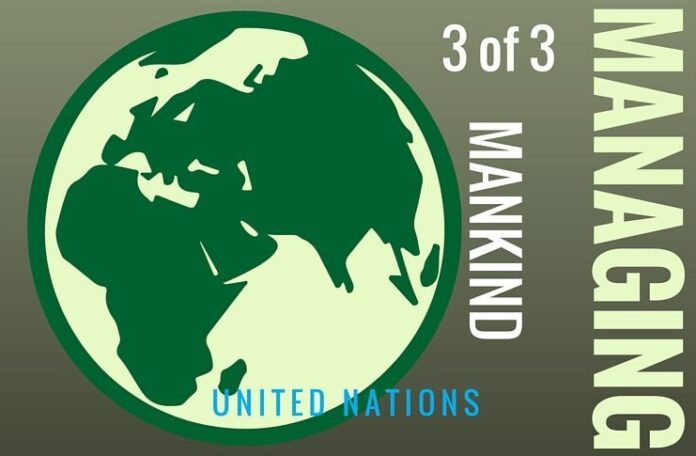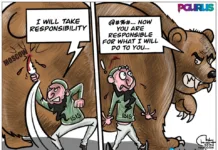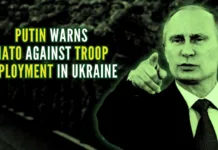
[dropcap color=”#008040″ boxed=”yes” boxed_radius=”8px” class=”” id=””]T[/dropcap]he most important organisational unit that affects humans is the United Nations. From the time of its inception in 1945 to 2010, the year when many writers began to record the decline of the USA as a Superpower, the UN’s impact on mankind was wide and spectacular, despite its numerous failures. Dilip Chandra has noted that the UN negotiated 152 peace settlements, Korean and Cuban inter alia, that ended regional conflicts.1 Richard Spencer, another researcher, observed that UN efforts led to fewer deaths in the first decade of the twentieth century than in any decade of the twentieth.2 Vladislav Guerassev stresses, in an interview, the wide range of issues that the UN dealt with in order to preserve the international system: space, trade, sea, human rights, de-mining, de-colonization, nuclear energy, human settlements, and the protection of children.3 On December 9, 2015, the UN tried to include youth, 18-29 year olds, into the decision- making process for peace and security and the future of mankind.4
Not all efforts by the UN were successful. Spencer cites the Rwandan genocide, the child sex abuse in the Congo, and genocide in Bosnia. One might add that the powers that held the veto in the Security Council were themselves toying with actions that might still lead to World War III.
There were several reasons for these limited successes. The organisations dealing with world peace were not as powerful as the UN, which itself operated by consensus: the Maharishi Vedic Pandits were more like spiritual philosophers than men of action. The Organisation for World Peace seemed to dovetail its actions with the World Peace Council. And, the World Peace Council seemed to subjugate its efforts to the UN, though its headquarters are separate, in Athens.
[dropcap color=”#008040″ boxed=”yes” boxed_radius=”8px” class=”” id=””]S[/dropcap]econdly, and this is important, the founding nations of the UN who had the veto, were all imperialists who used the UN to further their own interests. China annexed parts of Mongolia, Xinyang and Tibet against the will of the inhabitants; Britain, France and the US created Israel on Palestinian territory; and the Russian bear swallowed parts of Central Asia. Although these were powers that won the Second World War, they were theoretically disqualified from leading the world on ethical principles.
Thirdly, any organisation experiences a point when restructuring is needed for greater efficiency. The UN has reached such a point as the balance of power has changed. The veto is needed to avoid the misuse of power, and the process for offering veto power needs to be democratic. Currently we have two camps, the West and 65 supporting countries, and the East which includes Russia-China and their supporters. Therefore, the theoretical basis of the UNSC has to be improved. Since culture is an important determinant when tackling negotiations, it has to be factored in. So does contributions: so far, the USA has borne the brunt of the expenditure of the UN. Today the top 10 funders are: USA – 28.38% of the UN budget; Japan – 10.83%; Britain – 8.46%; France – 7.2%; Germany – 7.14%; China – 6.64%; Italy – 4.45%; Russia – 3.15%; Canada – 2.98%; Spain – 2.9%.5
The current membership of the UNSC is:
- 5 permanent members: Britain, China, France, Russia and USA.6
- 10 non-permanent members elected by UNGA; each requires at least a two-thirds majority vote (129) in UNGA.7
Retiring members: Chad, Chile, Jordan, Lithuania & Nigeria.
[dropcap color=”#008040″ boxed=”yes” boxed_radius=”8px” class=”” id=””]O[/dropcap]n January 1, 2016, Senegal (187 votes), Japan (184), Egypt (179), Ukraine (177), Uruguay (185), will join 5 other non-permanent members, Angola, Malaysia, New Zealand, Spain, and Venezuela. The non-permanent members are geographically dispersed.8
Ukraine is included in the 2016 non-permanent group since the crisis between Ukraine and Russia will peak in 2016, and the UN will be called upon to advance Ukraine’s interests, as it did with Israel. Even at the UNSC level, the US tries to “buy” support by offering each non-permanent member an increase in aid by 58%, and from the UN by 5%.9
The best formula for UNSC vetoes that takes in ethnicity, population, regional power, and the principle of parity is this: one each for the US; Southern Africa; China; India; Latin America; Russia; Saudi Arabia or Turkey; Scandinavia; ASEAN; and the European Union. The ten veto votes are dispersed fairly. The leadership of one cultural group can change whenever desired: for instance, the US can rotate among Britain, Australia and Canada. Non-membership for this purpose should be abolished. If necessary one more cultural group can be included in the UNSC for majority voting. If the power of a major country causes frustration, the UN10 can be by-passed, as is usually done, in which case there should be a penalty. The major weakness of the UN has been that its rules have not kept pace with developments that have emerged or are emerging.
[dropcap color=”#008040″ boxed=”yes” boxed_radius=”8px” class=”” id=””]F[/dropcap]ourthly, experiments in laboratories have shown that several failures usually precede a success. Consequently, the case for strengthening the UN is stronger than the argument for replacing it with a new body. When sanctions were imposed against it, Russia was looking in vain for the UN to be an Appeals Court for the world. There seemed to be no power to stop Turkey from occupying the Boshiqa region in northern Iraq with 150 troops and 25 tanks, while Russia was seeking a statement in the UN.11
Fifthly, the major powers that are responsible for establishing peace in the world are the very ones that destabilize the world. Had the US and its coalition not try to setup a “moderate” opposition to Assad’s rule in Syria, there would not have been a civil war, over seven million refugees, and the UN would not require $20 billion for the largest humanitarian appeal ever.12 The UN has collected only $7.15 billion so far for this humanitarian aid. Take another situation, where USA and NATO ships are held at gunpoint in the Black Sea by Russia in an escalating series of episodes that portend to lead to World War III.13
Sixthly, powerful nations often ignore international regulations that are intended to set standards. The reason given by a former US ambassador to the UN Donald McHenry is that the UN, and UNGA, is not an ‘action body.’14 Take the case of Russia. In 2014, Russia was ordered to pay shareholders of an oil firm $1.4 billion. Russia was also subject to 218 human rights complaints, 122 of which were breaches. Putin signed a bill which gave his Constitutional Court the right to judge whether the Strasbourg-based international court’s decisions should apply to Russia.15 In other words, the Russian Constitutional Court supersedes the UN one, which should not be the case.
[dropcap color=”#008040″ boxed=”yes” boxed_radius=”8px” class=”” id=””]C[/dropcap]onsider the cases brought by the Belgium government from 1994 to 2003. The case against those that were responsible for the Rwandan crisis went on smoothly in 1994. But the cases against Ariel Sharon, and those responsible for the Iraq War were successfully opposed, outside court, on the grounds that Belgium had no right to be a global crimes prosecutor for past and future leaders and Human Rights activists. Sharon had allowed Palestinian refugees to be massacred by Lebanese Christian Phalangists in Lebanon while he was in charge as an occupier.16 The US used cluster bombs in Iraq and the accusation that Iraq had Weapons of mass Destruction was a blatant lie. The US threatened to relocate NATO headquarters and Belgium would lose an investment of $352 million.17 Belgium had to change its laws: It would try cases only if the victim or suspect were a Belgium citizen, or a long-time resident at the time of alleged crime; all world leaders would be granted diplomatic immunity. In another 1991 case, the Israeli lobby in the US repealed UN Resolution 3379 that declared Zionism was racist.
It appears that the excellent judicial branches of the world body seemed to be defanged by the world powers. The UN has courts that are permanent bodies, like the International Court of Justice and the Law of the Sea. The UN has arbitral tribunals for each case like the permanent Court of Arbitration, the WTO Appellate Bodies for sport, land disputes, and investment. The UN also has quasi-judicial institutions like Committees for human rights, racial and cultural rights, rights for the child, torture, and for migrant workers but its rulings are not binding. To be effective, these court decisions, or some of them, have to binding, enforceable and applicable to all; the playing field has to be leveled.
UNGA should be more active by suggesting reforms that would prevent wars.
Bibliography
- Dilip Chandra, “Successes and failures of the UN,”hubpages.com, November 13, 2015.
- Richard Spencer, “UN at 70: Five great successes and failures,” telegraph.co.uk, December 12, 2015.
- Vladislav Guerassev, “Is the UN a failure or success?
- SC/12149, “Security Council, Unanimously Adopting Resolution 2250 (2015), Urges member states to increase representation of youth in decision-making at all levels.”
- Global Policy Forum, “Top Ten Providers of Assessed Contributions to UN Budgets,” globalpolicy.org. See also Newsteam staff, “CFR backgrounders,” cfr.org, September 2, 2015.
- David Bosco, “The US doesn’t want to reform the UNSC,” foreignpolicy.com, September 29, 2015.
- “General Assembly Adopts without vote ‘Landmark’ decision on Advancing Efforts to Reform Increase Membership of Security Council,” un.org, September 14, 2015.
- Xinhua, “Five countries elected as non-permanent members of UNSC,” chinadaily.com.cn, 16.10.2015.
- Hannah Buckley, “A critique of the UNSC,”fordhampoliticalreview.org, April 5, 2013.
- “Why is permanent membership of the UNSC such a big deal?” the newswrite.com, April 12, 2015.
- “Russian Ambassador to UN Vitaly Churkin, “UN refuses Russian request to make statement against Turkey, Iraq downplays request,” todayszaman.com, December 9, 2015.
- “UN agencies partners to seek more than $20 billion,” metronews, December 8, 2015.
- Part2 – China’s Road to Superpower status - July 20, 2017
- Part1 – China’s Road to Superpower status - July 18, 2017
- P2 – Can or should Qatar be ostracised? - June 29, 2017










